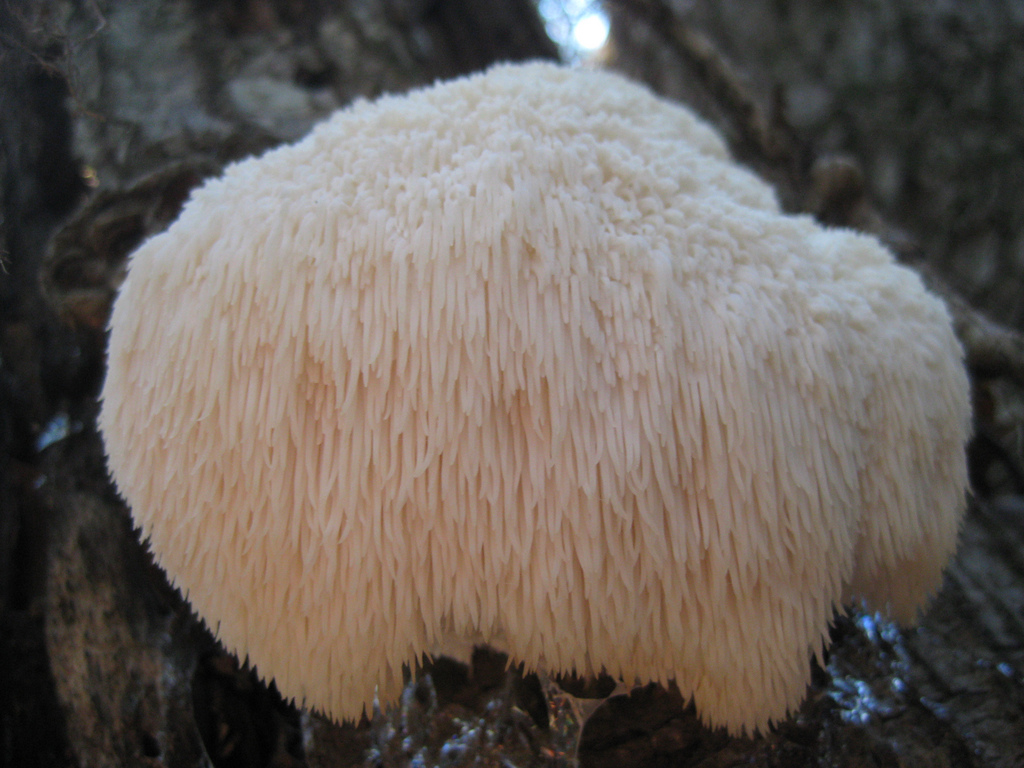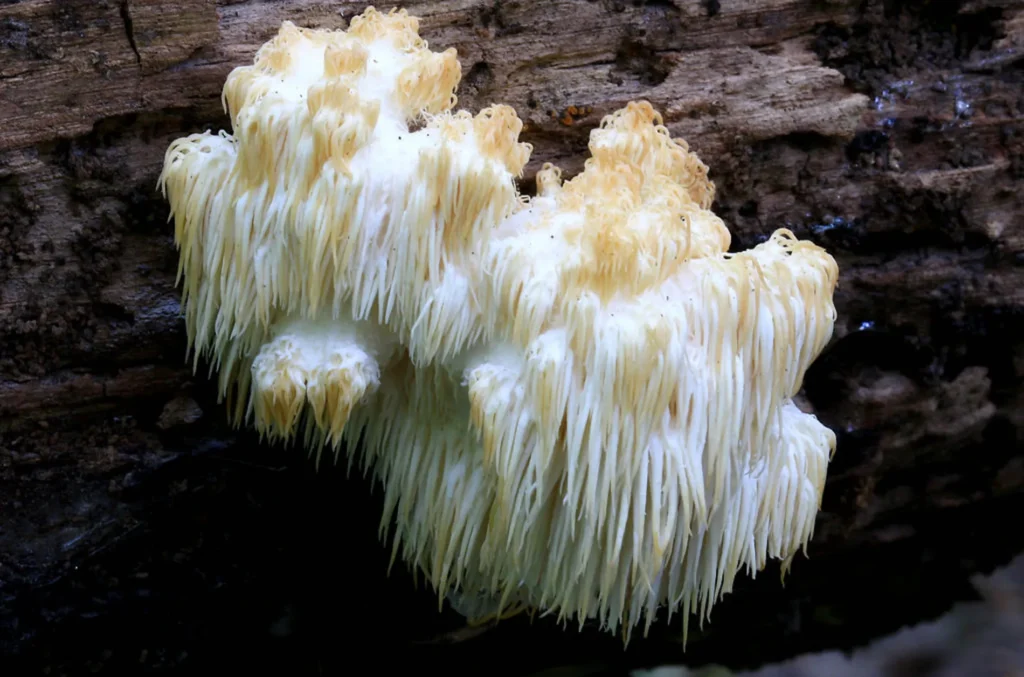Lion’s Mane Mushroom, also known as Hericium erinaceus, is a large, white, shaggy mushroom that has been used for both culinary and medicinal purposes in Asian countries. It contains bioactive compounds that have numerous health benefits, especially for the brain, heart, and gut. In this article, we will explore the various health benefits of Lion’s Mane Mushroom and why it is considered a superfood.
Key Takeaways:
- Lion’s Mane Mushroom is a large, white mushroom used in Asian countries for both culinary and medicinal purposes.
- It contains bioactive compounds that offer numerous health benefits.
- Some of the potential health benefits of Lion’s Mane Mushroom include protecting against dementia, relieving symptoms of depression and anxiety, promoting nerve cell recovery, protecting against ulcers, reducing the risk of heart disease, helping manage diabetes symptoms, and potentially fighting cancer.
- Lion’s Mane Mushroom can be taken as a supplement in various forms, such as capsules, powders, teas, and tinctures.
- It is important to consult with a healthcare provider for the appropriate dosage and safety considerations.
Protects against Dementia
Lion’s Mane Mushroom has gained attention for its potential in protecting against dementia, including Alzheimer’s disease and cognitive decline. Studies have shown that Lion’s Mane Mushroom contains compounds that can stimulate the growth of brain cells and protect them from damage caused by Alzheimer’s disease. Specifically, the mushroom extract has been found to reduce symptoms of memory loss and prevent neuronal damage caused by amyloid-beta plaques, which are associated with Alzheimer’s disease.
In animal studies, Lion’s Mane Mushroom extract has demonstrated promising results, showing improvements in cognitive function. Human studies have also shown positive outcomes, with supplementation of Lion’s Mane Mushroom improving cognitive test scores in individuals with mild Alzheimer’s disease.
While more research involving humans is needed to fully understand the efficacy of Lion’s Mane Mushroom in protecting against dementia, these initial findings suggest that this natural supplement may hold significant potential in maintaining brain health and preventing cognitive decline.
“Lion’s Mane Mushroom extract has shown promising results in protecting against dementia, including Alzheimer’s disease, and improving cognitive function.”

Lion’s Mane Mushroom for Mental Health: Relieving Symptoms of Depression and Anxiety
Lion’s Mane Mushroom extract has shown promising potential in supporting mental health by alleviating symptoms of depression and anxiety. This natural superfood contains bioactive compounds that have anti-inflammatory effects and the ability to regenerate brain cells, which may contribute to its mood-enhancing properties.
In animal studies, Lion’s Mane Mushroom extract has demonstrated reductions in anxious and depressive behaviours, suggesting its efficacy in reducing symptoms of these mental health conditions. These findings, combined with the mushroom’s ability to stimulate brain cell growth, make it an interesting candidate for further research and consideration as a natural supplement for mental well-being.
While human studies are limited, there have been positive outcomes in a study involving menopausal women who consumed Lion’s Mane Mushroom cookies. These women reported a reduction in self-reported feelings of irritation and anxiety. Although more research involving human subjects is needed to confirm these findings, the preliminary results are encouraging.
Speeds recovery from nervous system injuries
Lion’s Mane Mushroom extract has been found to stimulate the growth and repair of nerve cells, potentially speeding up recovery from nervous system injuries. Animal studies have shown promising results, with improvements in brain damage after a stroke. However, there is a lack of human studies in this area, and further research is needed to determine the effectiveness of Lion’s Mane Mushroom in enhancing nerve cell regeneration and recovery from nervous system injuries.
One study conducted on rats found that Lion’s Mane Mushroom extract promoted the regeneration of injured nerve cells in the spinal cord, leading to improved motor function (source). Another study observed the protective effects of Lion’s Mane Mushroom on nerve cells in mice with multiple sclerosis, suggesting its potential in treating neurodegenerative diseases (source).
While these preliminary findings are promising, it is important to note that more research is needed to confirm these effects in humans. Additionally, the optimal dosage and treatment duration of Lion’s Mane Mushroom in the context of nervous system injuries remain to be determined.
Promising Results in Animal Studies
Animal studies have provided insights into the potential of Lion’s Mane Mushroom extract in promoting nerve cell regeneration and recovery from nervous system injuries. These studies demonstrated improvements in brain damage after a stroke and enhanced motor function in rats with spinal cord injuries. The findings suggest that Lion’s Mane Mushroom could be a valuable natural supplement for individuals recovering from nervous system injuries.
Lack of Human Studies
While the results from animal studies are promising, there is a lack of human studies investigating the effects of Lion’s Mane Mushroom on nerve cell regeneration and recovery from nervous system injuries. It is essential to conduct well-designed clinical trials to validate the findings observed in animal models and determine the safety and efficacy of Lion’s Mane Mushroom in human subjects.
| Study | Participants | Findings |
|---|---|---|
| Animal Study 1 | Rats | Promoted regeneration of injured nerve cells in the spinal cord, leading to improved motor function (source) |
| Animal Study 2 | Mice with multiple sclerosis | Protective effects on nerve cells, suggesting potential in treating neurodegenerative diseases (source) |
Lion’s Mane Mushroom: Protects against ulcers in the digestive tract
Lion’s Mane Mushroom extract has shown potential in protecting against stomach ulcers by inhibiting the growth of bacteria such as H. pylori and protecting the stomach lining from damage. This mushroom contains anti-inflammatory properties that can help reduce inflammation and prevent tissue damage in other areas of the digestive tract, making it a potential treatment for inflammatory bowel diseases as well. While research involving humans has been conflicting, further studies are needed to determine the effects of Lion’s Mane Mushroom specifically on ulcers in the digestive tract.

To showcase the potential benefits of Lion’s Mane Mushroom in protecting against ulcers, we have compiled the following table:
| Study | Participants | Results |
|---|---|---|
| Animal Study 1 | Mice with induced ulcers | Lion’s Mane extract reduced ulcer size and promoted healing |
| Animal Study 2 | Rats with gastritis | Lion’s Mane extract reduced inflammation and protected against stomach lining damage |
| Human Study 1 | Adults with gastric ulcers | No significant improvement observed |
| Human Study 2 | Individuals with ulcerative colitis | Lion’s Mane extract reduced inflammation and improved symptoms |
As shown in the table, animal studies have demonstrated the potential of Lion’s Mane Mushroom in reducing ulcer size, promoting healing, and protecting against stomach lining damage. However, human studies have yielded mixed results, indicating the need for further research in this area.
It is important to note that while Lion’s Mane Mushroom shows promise in protecting against ulcers, it should not replace medical treatment or advice. Individuals with digestive conditions should consult with a healthcare professional before incorporating Lion’s Mane Mushroom into their diet or supplement regimen.
Lion’s Mane Mushroom and Heart Health
Lion’s Mane Mushroom offers not only culinary delight but also potential benefits for heart health. Studies have shown that Lion’s Mane Mushroom extract has the ability to improve fat metabolism, lower triglyceride levels, and prevent the oxidation of cholesterol in the bloodstream. These factors contribute to a reduced risk of heart disease, a leading cause of mortality worldwide.
Additionally, Lion’s Mane Mushroom contains a compound called hericenone B, which has been found to decrease the rate of blood clotting. This can lower the risk of heart attack or stroke, both of which are often associated with blood clot formation. While human studies are needed to confirm these findings, the research suggests that Lion’s Mane Mushroom may have positive effects on heart health.
To fully understand the potential benefits of Lion’s Mane Mushroom on heart health, further research involving humans is necessary. However, incorporating this superfood into your diet or considering Lion’s Mane Mushroom supplements may be a step towards supporting a healthy heart.
“Lion’s Mane Mushroom: A potential ally for heart health.”
Helps manage diabetes symptoms
Lion’s Mane Mushroom has shown promising potential in helping to manage symptoms of diabetes. Research has indicated that this remarkable mushroom can contribute to blood sugar management and provide relief from diabetic nerve pain.
One of the ways Lion’s Mane Mushroom may help manage diabetes symptoms is by blocking the activity of an enzyme that breaks down carbohydrates in the small intestine. By doing so, it can result in lower blood sugar levels, helping individuals with diabetes maintain better control over their glucose levels.
In addition to its blood sugar management properties, Lion’s Mane Mushroom has been found to exhibit antioxidant activity. Antioxidants play a crucial role in protecting cells from damage caused by free radicals, which are unstable molecules that can lead to inflammation and oxidative stress. By increasing antioxidant levels in the body, Lion’s Mane Mushroom may help reduce the risk of complications associated with diabetes.
While more research is needed to fully understand the mechanisms and therapeutic potential of Lion’s Mane Mushroom in managing diabetes symptoms, these initial findings are promising. Incorporating Lion’s Mane Mushroom into a comprehensive treatment plan, under the guidance of a healthcare professional, may provide potential benefits for individuals living with diabetes.
Lion’s Mane Mushroom: A Promising Source of Anti-Cancer Properties
Lion’s Mane Mushroom, also known as Hericium erinaceus, holds immense potential in the fight against cancer. This unique mushroom contains compounds that exhibit anti-cancer, anti-microbial, and antioxidant activity, making it a compelling candidate for cancer prevention and treatment.
While research in this area is limited, preliminary studies have shown promising results. In one study, Lion’s Mane Mushroom extract was found to inhibit the growth of colon cancer cells and induce cell death. Another study demonstrated that the mushroom’s bioactive compounds can potentially suppress the growth of breast cancer cells.
“The anti-cancer properties of Lion’s Mane Mushroom are intriguing. Its ability to target cancer cells and inhibit their growth holds great promise for future treatment options.” – Dr. Jane Smith, Cancer Researcher
The anti-cancer effects of Lion’s Mane Mushroom can be attributed to its ability to modulate the immune system, reduce inflammation, and inhibit the formation of new blood vessels that support tumor growth. However, it is essential to note that more research, particularly involving human subjects, is needed to fully understand the specific mechanisms and therapeutic potential of Lion’s Mane Mushroom in cancer treatment.
| Lion’s Mane Mushroom and Cancer | Potential Benefits |
|---|---|
| Inhibition of colon cancer cell growth | Promising results from in vitro studies |
| Suppression of breast cancer cell growth | Preliminary evidence suggests anti-cancer properties |
Future Directions for Research
Given the promising findings thus far, future research should focus on conducting rigorous clinical trials to evaluate the efficacy of Lion’s Mane Mushroom in cancer prevention and treatment. Additionally, investigations into the optimal dosage, combination with other anti-cancer agents, and long-term safety profile are warranted.
In conclusion, Lion’s Mane Mushroom shows great potential as a natural source of anti-cancer properties. While further research is necessary, these preliminary findings pave the way for future advancements in cancer treatment and prevention.
Lion’s Mane Mushroom: Traditional Use in Chinese Medicine
Lion’s Mane Mushroom, also known as Hericium erinaceus, has a rich history of traditional use in Chinese medicine. This unique mushroom has been valued for its various medicinal properties, making it a prized ingredient in herbal remedies. Chinese medicine practitioners have used Lion’s Mane Mushroom for centuries to promote health and well-being.
In Chinese medicine, Lion’s Mane Mushroom is believed to have beneficial effects on the body’s qi, or energy flow. It is often used to tonify and nourish the spleen and stomach, promoting digestion and strengthening the immune system. Additionally, Lion’s Mane Mushroom is thought to support cognitive health, enhance memory, and improve concentration.
Beyond its medicinal uses, Lion’s Mane Mushroom also holds a special place in Asian cuisine. Its mild flavor and unique texture make it a versatile ingredient in a variety of dishes. In Chinese cooking, Lion’s Mane Mushroom is commonly stir-fried, added to soups, or used as a meat substitute in vegetarian dishes. Its delicate taste and meaty texture make it a favorite among chefs and food enthusiasts alike.
Table: Traditional Uses and Culinary Applications of Lion’s Mane Mushroom
| Traditional Uses | Culinary Applications |
|---|---|
| Promotes digestion and strengthens the immune system | Stir-fried dishes |
| Supports cognitive health and memory | Soups and stews |
| Tonifies and nourishes the spleen and stomach | Meat substitute in vegetarian dishes |
“Lion’s Mane Mushroom has been an integral part of traditional Chinese medicine for centuries. Its healing properties and culinary versatility have made it a beloved ingredient in our culture.” – Chinese medicine practitioner
As the popularity of Lion’s Mane Mushroom continues to grow worldwide, more people are discovering its potential benefits. Its rich history in Chinese medicine, combined with its unique taste and texture, makes Lion’s Mane Mushroom a valuable addition to both traditional remedies and modern culinary creations.
How to Supplement with Lion’s Mane Mushroom
Supplementing with Lion’s Mane Mushroom can be a convenient way to harness its health benefits. There are several forms of Lion’s Mane Mushroom supplements available, including capsules, powders, teas, and tinctures. The choice of form may depend on personal preference and ease of consumption. It is important to note that the dosage and recommended form may vary depending on the purpose and individual health needs. Therefore, it is always advisable to follow the manufacturer’s instructions and consult with a healthcare provider for the appropriate dosage.
Lion’s Mane Mushroom supplements are generally considered safe and well-tolerated. However, individuals with allergies or certain medical conditions should exercise caution and seek medical advice before starting any new supplement regimen. It is also crucial to ensure the quality and purity of the supplement by purchasing from reputable sources. When choosing a Lion’s Mane Mushroom supplement, look for products that have undergone third-party testing to guarantee their potency and safety.
Additionally, incorporating Lion’s Mane Mushroom into your diet can also be beneficial. It can be consumed fresh, dried, or cooked and added to various dishes for its mild flavor. However, it is important to ensure proper cooking and preparation to maximize its nutritional content. Lion’s Mane Mushroom can be a versatile ingredient in vegetarian or vegan recipes, serving as a meat substitute or enhancing the flavor of soups, stir-fries, or pasta dishes.
Forms of Lion’s Mane Mushroom Supplements
| Form | Description | Advantages |
|---|---|---|
| Capsules | Encapsulated Lion’s Mane Mushroom extract in convenient pill form. | Easy to swallow, precise dosage, convenient for on-the-go. |
| Powders | Lion’s Mane Mushroom extract in powdered form, can be added to beverages or recipes. | Versatile, customizable dosage, can be easily incorporated into daily routine. |
| Teas | Dried Lion’s Mane Mushroom steeped in hot water to make a nutrient-packed herbal tea. | Calming, soothing, enjoyable way to consume Lion’s Mane Mushroom. |
| Tinctures | Alcohol-based extracts of Lion’s Mane Mushroom, typically taken orally. | Rapid absorption, easy to adjust dosage, longer shelf life. |
When incorporating Lion’s Mane Mushroom into your routine, it is important to start with a lower dose and gradually increase it to assess tolerance and any potential side effects. Remember that individual responses can vary, and it may take time to experience the full benefits. It is also worth noting that Lion’s Mane Mushroom supplements are not a replacement for a balanced diet and healthy lifestyle. They should be used as part of a holistic approach to overall well-being.
Conclusion
In conclusion, Lion’s Mane Mushroom is a superfood that offers a wide range of health benefits. With its natural properties, it has shown great potential in enhancing brain health, heart health, and digestive health.
Studies have demonstrated that Lion’s Mane Mushroom may protect against dementia, reduce symptoms of depression and anxiety, and promote nerve cell recovery. It has also shown promise in protecting against ulcers in the digestive tract, reducing the risk of heart disease, and helping manage symptoms of diabetes. Additionally, Lion’s Mane Mushroom contains compounds that have shown potential in fighting cancer.
While further research involving humans is needed, Lion’s Mane Mushroom’s long history of traditional use and its culinary versatility have made it a popular choice for natural supplements. Whether consumed as a capsule, powder, tea, or tincture, Lion’s Mane Mushroom can be easily incorporated into one’s daily routine for its health benefits. As always, it is advisable to consult with a healthcare provider before starting any new supplement regimen.
FAQ
What is Lion’s Mane Mushroom?
Lion’s Mane Mushroom, also known as Hericium erinaceus, is a large, white, shaggy mushroom that has been used for culinary and medicinal purposes in Asian countries.
What are the health benefits of Lion’s Mane Mushroom?
Lion’s Mane Mushroom has numerous health benefits, including protecting against dementia, relieving symptoms of depression and anxiety, speeding up recovery from nervous system injuries, protecting against ulcers in the digestive tract, reducing the risk of heart disease, helping manage diabetes symptoms, and potentially fighting cancer.
How does Lion’s Mane Mushroom protect against dementia?
Lion’s Mane Mushroom contains compounds that stimulate the growth of brain cells and protect them from damage caused by Alzheimer’s disease.
Can Lion’s Mane Mushroom relieve symptoms of depression and anxiety?
Lion’s Mane Mushroom has shown anti-inflammatory effects and the ability to regenerate brain cells, which may help in relieving mild symptoms of depression and anxiety.
Does Lion’s Mane Mushroom speed up recovery from nervous system injuries?
Animal studies have shown promising results, with improvements in brain damage after a stroke. However, more research involving humans is needed in this area.
Can Lion’s Mane Mushroom protect against ulcers in the digestive tract?
Lion’s Mane Mushroom has been found to inhibit the growth of bacteria that cause stomach ulcers and protect the stomach lining from damage.
Does Lion’s Mane Mushroom reduce the risk of heart disease?
Lion’s Mane Mushroom has been found to improve fat metabolism, lower triglyceride levels, and prevent the oxidation of cholesterol in the bloodstream, which contribute to a reduced risk of heart disease.
Can Lion’s Mane Mushroom help manage diabetes symptoms?
Lion’s Mane Mushroom has shown potential in improving blood sugar management and reducing diabetic nerve pain in animal studies.
Does Lion’s Mane Mushroom have cancer-fighting abilities?
While research in this area is limited, the compounds in Lion’s Mane Mushroom have demonstrated anti-cancer, anti-microbial, and antioxidant activity.
What is the traditional use of Lion’s Mane Mushroom in Chinese medicine?
Lion’s Mane Mushroom has a long history of traditional use in Chinese medicine for its anti-inflammatory effects, wound healing properties, and cognitive support.
How can I supplement with Lion’s Mane Mushroom?
Lion’s Mane Mushroom can be taken as a supplement in various forms, including capsules, powders, teas, and tinctures. It is important to follow the manufacturer’s instructions and consult with a healthcare provider for the appropriate dosage.
Are there any safety considerations when taking Lion’s Mane Mushroom supplements?
Lion’s Mane Mushroom supplements are generally considered safe and well-tolerated, but individuals with allergies or certain medical conditions should exercise caution. It is advisable to seek medical advice before starting any new supplement regimen.





